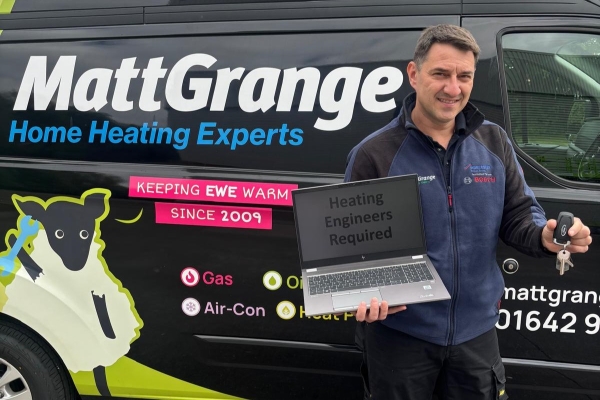Matt Grange, founder of Teesside-based Matt Grange Home Heating Experts, offers an honest look at the opportunities – and obstacles – for today’s heating professionals as well as a potential solution.
Matt Grange, founder of Teesside-based Matt Grange Home Heating Experts, offers an honest look at the opportunities – and obstacles – for today’s heating professionals as well as a potential solution.

We spoke with Matt Grange, founder of Teesside-based Matt Grange Home Heating Experts, to find out what’s driving a rise in demand for heating services, and why recruiting skilled engineers is becoming a critical challenge for the sector.
As the industry faces rising workloads, evolving technologies, and a maturing workforce, Matt offers an honest look at the opportunities – and obstacles – for today’s heating professionals as well as a potential solution.
While the overall boiler market may be softening, one local firm is feeling the heat. “I think the increase in demand is due to our growing reputation as an established company, our range of quality heating solutions, and effective marketing,” says Matt, whose business has been serving the North East since 2009.
“The boiler upgrade scheme and energy costs are also factors, but they don’t counter the effect of a declining market overall.”
Demand is unevenly spread. “We’re seeing the biggest rise in air conditioning and air source heat pumps (ASHPs),” he explains. “Natural gas and LPG are falling, and oil seems steady.”
Customer behaviour is shifting too. “More people are choosing to repair appliances – even if they still plan to replace them in the near future.”
Much of the firm’s new business comes from recommendations – something Matt believes reflects customer uncertainty and a desire for reassurance.
“Most customers don’t have much knowledge about heating systems. A personal recommendation means a lot. In today’s world, even online reviews act like that – they’re almost a personal referral from a stranger.”
And with increasing awareness around sustainability and fuel choice, customers are asking more questions than ever. “When considering a new boiler almost every customer asks about alternatives,” Matt says. “We walk them through the pros and cons, but the truth is there’s still a lot of uncertainty.”
That uncertainty, he believes, is made worse by inconsistent government policy. “It makes it really difficult to give clear advice. The mixed messaging on gas, LPG, oil, HVO, hydrogen – it doesn’t help anyone.”
Matt’s firm is expanding to meet demand, but skilled engineers are in short supply – particularly those experienced with oil. “There’s a real shortage,” he says. “We see applicants with a level of experience, but very few with the depth we’re looking for.”
And the challenge isn’t just finding the right talent. “We’ve had engineers apply, often disillusioned in their current role and excited by the prospect of joining us – but when we make a job offer, they go back to their employer who offers them the world to stay. It appears they may be using the offer as a bargaining chip.”
“We find a lot of qualified engineers are only familiar with the installation of combi boilers,” says Matt. “As a result, they lack experience of system or regular boilers, vented or unvented cylinders, S & Y plan systems or proper fault diagnosis.”
As technology evolves, so must training. “Demand is strong across the board, but ASHPs are clearly growing. The problem is that some training still lacks depth – like we’re all just winging it.”
When it comes to upskilling, his company works closely with manufacturers. “We have a good relationship with Worcester Bosch and use their training facilities. But MCS accreditation? That’s a huge barrier. I know firms who’ve done it – it’s all-consuming and beyond our resources at the moment.”
A deeper issue looms: the ageing nature of the sector’s workforce. “The workforce is ageing,” Matt notes. “Especially in the oil industry.
“Many younger engineers and trainees don’t see it as the future.”
Matt’s team has started to address this by putting both a newly qualified apprentice and an experienced plumber through OFTEC certification. But he’s frank about the barriers small businesses face.
“It’s every company’s responsibility to support apprenticeships – but the cost is a huge hurdle,” he says. “Hiring an 18-year-old apprentice costs the employer around £100,000 over four years, and we only get a £3,000 grant. Meanwhile, the college receives around £85,000 in government funding.”
He argues for a full overhaul of the funding model. “Payments should go to both college and employer in a structured way, triggered by achievement of key milestones.”
While filling new roles is the priority, recruitment is also creating opportunities for internal progression at Matt George. “We’re also hiring an office administrator, and by recruiting more installers, we’ll free up experienced staff to move into diagnostics and project management roles.”
The company welcomes entrants from outside the trade, too. “We’ve brought in engineers from the Royal Air Force, and we offer on-site and college-based training across a wide range of technologies. We think a broad knowledge base is essential.”
The challenges Matt’s business faces aren’t unique. “I’ve spoken with companies across the country who are in the same boat. We’re all struggling to recruit.”
And while he believes the appetite for apprenticeships exists, the current system is holding back progress. “When we advertise an apprenticeship, we get hundreds of applications. Young people want to get into the trade – but the system makes it too hard for businesses to take them on.”
For Matt, the solution is clear: restructure the way training is funded, support employers properly, and create a pipeline of skilled engineers who are ready for the real demands of today’s – and tomorrow’s – heating market.
Image provided by Matt Grange
© 2025 Created by Euromedia Associates Ltd